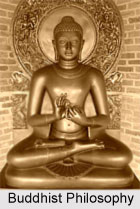 Concept of self in Buddhist philosophy is defined as a soul-entity. Buddhism defines that there is no existence of soul or God in this world. Buddhist philosophy clarifies that the concept of self or the individual subject is the empirical life of man, which grows and changes. Moreover, the Upanishads declare categorically that the true self of man is not to be identified with the body or the mental life which grows. Yet the union of mental and material qualities makes the individual. Every person as every thing is a synthesis, a compound. In all individuals, without exemption, the relation of the constituent parts to one another is ever changing. It is never the same for two successive moments. Man is a living continuous complex, which does not remain the same for two moments, and yet continues in an endless number of existences without being completely different from its own self. While both mind and body are in ceaseless change, impermanence is more marked and the flow more rapid in mind than in body.
Concept of self in Buddhist philosophy is defined as a soul-entity. Buddhism defines that there is no existence of soul or God in this world. Buddhist philosophy clarifies that the concept of self or the individual subject is the empirical life of man, which grows and changes. Moreover, the Upanishads declare categorically that the true self of man is not to be identified with the body or the mental life which grows. Yet the union of mental and material qualities makes the individual. Every person as every thing is a synthesis, a compound. In all individuals, without exemption, the relation of the constituent parts to one another is ever changing. It is never the same for two successive moments. Man is a living continuous complex, which does not remain the same for two moments, and yet continues in an endless number of existences without being completely different from its own self. While both mind and body are in ceaseless change, impermanence is more marked and the flow more rapid in mind than in body.
In Buddhist philosophy, it is further defined that individuality is an unstable state of being which is ever growing. It is a perpetual process with nothing permanent. Nothing here is permanent, neither name nor form. To the five ascetics of Isipathana in Varanasi, the second preaching was delivered on the non-existence of the soul - "The body is not the eternal soul, for it tends towards destruction. Nor do feeling, perception, disposition and intelligence together constitute the eternal soul, for were it so, it would not be the case that consciousness likewise tends towards destruction." The argument is repeated with the other skandhas. There is no self (or Atman) or person (pudgala) or living being (sattva) or principle of life (jiva) which is permanent. The theory of the skandhas is developed out of the namarupa of the Upanishads. The Atman of the Upanishads is, however, not the transmigrating self.
A different reason which led Lord Buddha to be silent about the soul was the conviction that the master instinct to affirm the ordinary self is the hidden root of all spiritual evil. He repudiates the popular delusion of the individual ego and disputes the reality of the surface self. It is however wrong to think that there is no self at all according to Buddha. The rational conclusion from this would be that something exists, though it is not the empirical self. This is also in agreement with Buddha`s statement that the self is neither the same as nor entirely different from the skandhas. It is not a mere composite of mind and body, nor is it the eternal matter, exempt from the variations of change. Lord Buddha neither affirms nor denies its existence. Buddha contents himself with a description of psychical phenomena, and does not venture to put forth any theory of the soul. Rational psychologists attempt to describe the nature of the soul, its finiteness or otherwise. Moreover, the Upanishads arrive at the ground of all things by stripping the self of veil after covering of unforeseen event. Further, Lord Buddha denies the immortality of the fleeting elements which constitute the complex empirical individual. Buddha consistently refuses to deny the reality of the soul.
Thus, as per the philosophies of Buddhism, concept of self is said to have two main components - firstly, the desire for continuous existence and secondly the affection to an individual`s own view. This concept is at first conceived through a person`s sensory organs.



















